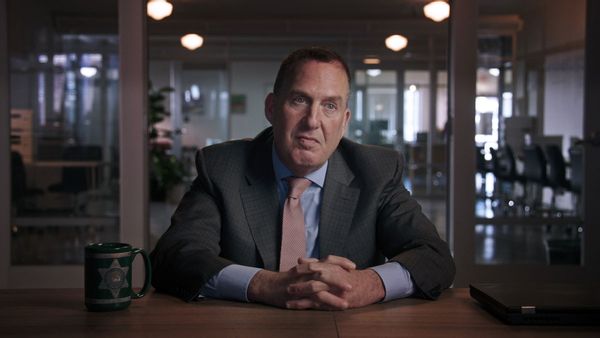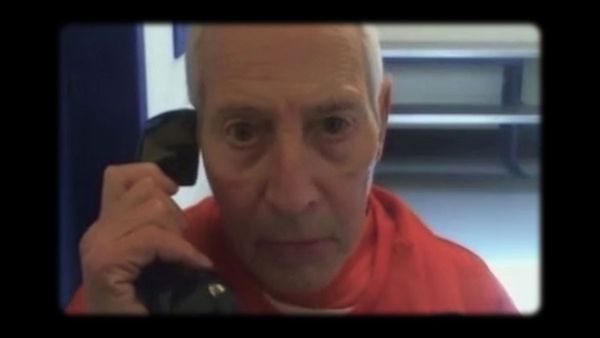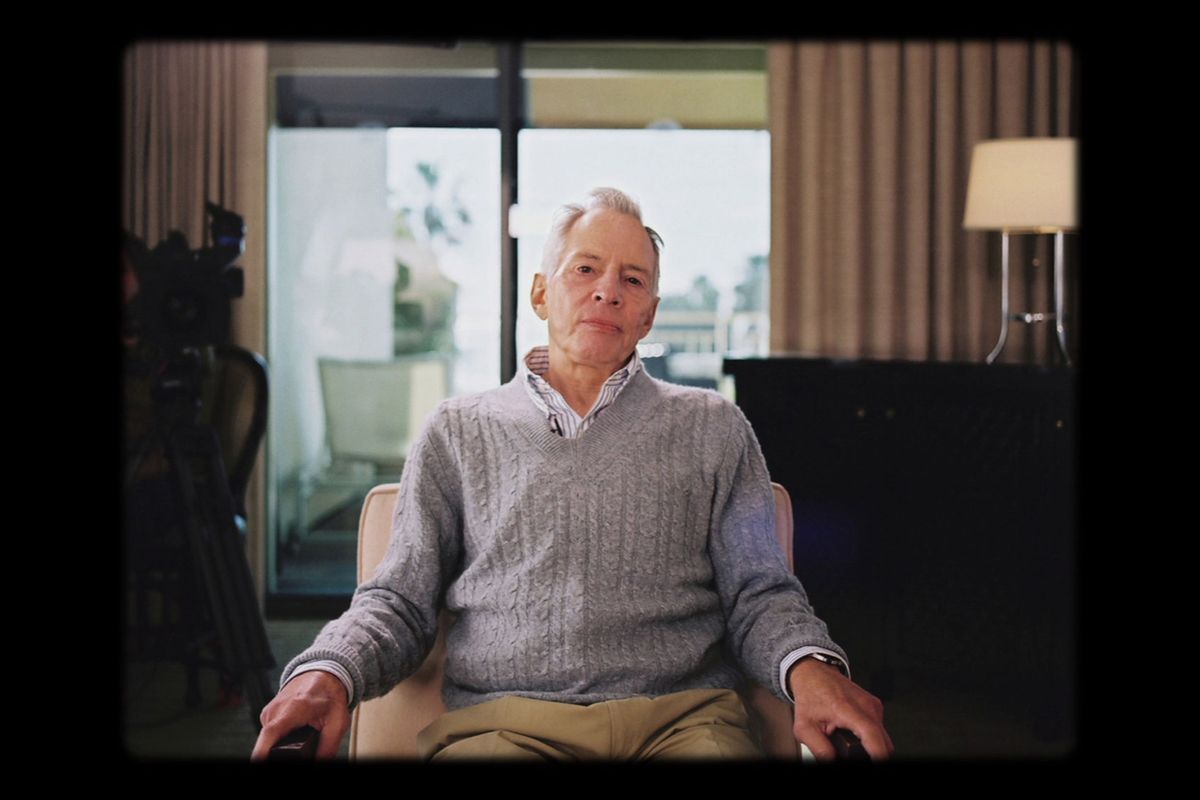One of the oddest aspects of 2015's “The Jinx: The Life and Deaths of Robert Durst” is how badly Robert Durst wants to be known and understood. By the time he reached out to writer/director Andrew Jarecki, Durst was already a prime suspect in his wife Kathleen Durst's 1982 disappearance and two other homicides. He was also the oldest son of an extremely wealthy and influential New York real estate tycoon who handed the keys to the kingdom to his younger brother.
Jarecki’s 2010 film “All Good Things,” written by his "Jinx" co-producer Marc Smerling, was based on Durst's 2003 trial for the murder of his neighbor Morris Black, whom he admitted to dismembering. Durst may have never faced a Galveston, Texas jury if he hadn’t been caught trying to steal a grocery store sandwich while he was on the lam. He ended up being acquitted anyway. Late-night comedians had a field day with that verdict and the circumstances leading up to it.
Similarly, had he never suggested that Jarecki interview him in the first place, we might have never reaped the true-crime superbloom "The Jinx" initiated. Nine years after those original episodes aired, recalling that Durst told Jarecki in the 2015 series premiere, “I’m not interested in doing a true crime kind of stuff” is just short of hilarious.
But flattery will get you everywhere with some people. "All Good Things" cast Ryan Gosling as character based on Durst and Kirsten Dunst as Kathleen's fictional double. That convinced Durst that Jarecki understood him. Referring to the bevy of salivating producers he’s brushed off in the past, he tells the filmmaker, “You know more about Robert Durst than any of those people do.” And how. By the sixth episode Jarecki has Durst dead to rights to such a degree that Durst excuses himself to the bathroom and, forgetting his mic is still hot, murmurs, “There it is. You’re caught.”
A few beats later he murmurs the words that knocked the collective wind out of the audience: “What the hell did I do? Killed them all, of course.”
“The Jinx” faded to black after that. Then the media cycle took over. Jarecki, his co-producers Smerling and Zac Stuart-Pontier, and their team had handed over their findings to authorities, who found and arrested Durst hours before the finale premiered in connection with his longtime friend Susan Berman's unsolved murder in 2000.
The subsequent national headlines provided the story's finale in real time; the epilogue being that Durst was tried and eventually convicted of killing Berman in 2021. Durst's acquittal precluded his retrial for Black's murder, and New York authorities charged Durst with Kathleen's death in 2021, although he died in 2022 before he could be tried.
Teasing out the perverse humor of this saga can’t be helped, and in some instances, there is no other choice.
That means “The Jinx — Part Two” lacks the urgency, necessity and cultural impact of those 2015 episodes. Durst is gone; his name condemned.
But he was quite a character, an elderly man who looked like a librarian, as someone describes him, and whose lizard-like way of blinking invited amateur readings of the ever errant tic. In this time of franchise extensions we should be amazed that HBO and Jarecki took this long to wring what they could out of the trial stage of the story.
“Part Two” picks up in the aftermath of his 2015 capture and plays as equal parts self-referential victory lap and effort to wrap up unfinished business. This time Jarecki sagely minimizes his on-camera presence in the four episodes made available for review, ceding the hero edit to L.A. Deputy District Attorney and cold case specialist John Lewin.
Lewin is avuncular without seeming overbearing, which is key in a story about a creepy yet bizarrely clownish killer. He’s aggressive in recorded conversations with uncooperative witnesses, but otherwise a steady hero wrangling a circus. Some of the entertainment is courtesy of twin law clerks Michael and David Belcher, two players on his team. Lewin and the producers validate their competence too, but the boyish delight they take in being assigned to the case and listening to Durst’s phone call recordings is infectious.
That is mainly what these episodes offer: a diversion for TV completists. Maybe that's the totality of what people expect from this sequel. Not many true crime titles fulfill a cultural need these days or, as the first six episodes did, result in justice finally being meted out to wrongdoers, although Durst's was thoroughly delayed. But these fresh installments are less concerned with him than investigating the people who abetted his crimes and kept his secrets.
 LA Deputy District Attorney John Lewin in "The Jinx – Part Two" (HBO)Few people nearly get away with one murder by themselves, let alone three, which informs Jarecki’s direction. Paraphrasing Lewin, when you have a whole lot of money, people are willing to do things for you, including assist your flight from prosecution, in the hope that some of it might go their way.
LA Deputy District Attorney John Lewin in "The Jinx – Part Two" (HBO)Few people nearly get away with one murder by themselves, let alone three, which informs Jarecki’s direction. Paraphrasing Lewin, when you have a whole lot of money, people are willing to do things for you, including assist your flight from prosecution, in the hope that some of it might go their way.
Some people did get a payday, like Durst's substantially younger longterm confidante Susan Giordano. She visits him in prison and giggles at his queasy flirtations. He instructs another friend to give her $150,000 to build a "love nest" where the two of them might canoodle after his release, which may have been news to his wife Debrah Charatan.
In 2015 "The Jinx" was something original, a crime docuseries striving to match the quality of HBO's highbrow scripted shows. Succeeding brought questions of journalistic integrity, particularly when the unadulterated recording of Durst's bathroom confession showed that the filmmakers had switched the order of those bone-chilling sentences. Since then, and because of "The Jinx," fewer people question a filmmaker's right to reorder the details to serve a show's dramatic power.
Then again, that casual approach to "true" storytelling relaxes the tension and makes the spots where Jarecki teasing out the saga's perverse humor stick out a bit discordantly.
Some absurdity is inherent to this season, and there's simply no getting around it. One of the few witnesses who knows both Durst and Berman is their mutual friend Nick Chavin, who made a 1976 album called “Country Porn" that it's safe to assume escaped Billboard's record-keepers. (He treats us to a serenade of one of his colorful ditties with an X-rated title, so there's that to look forward to.) Chavin remains loyal to Durst through his trials and other accusations, claiming that hearing his pal carved up a body with a bone saw “just didn’t have any impact on me."
Some of that nonchalance may be related to the fact that Durst got him a lucrative job in advertising. “Friendships die hard," he says without a sliver of irony.
We need your help to stay independent
If this seems a bit Trumpian to you, you're not off base; the former president's frequent courtroom appearances may have played some part in HBO's decision to revisit "The Jinx." Granted, there isn’t much about our daily lives that doesn’t explain Donald Trump's hold on America and why his followers stand by him despite his felonious behavior. But it’s next to impossible to watch these new chapters without drawing parallels beyond noticing that both Trump and Durst are New York real estate scions, failsons and narcissists dangling some reward before those who stroke their egos.
When you have a whole lot of money, people are willing to do things for you in the hope that some of it might go their way.
“Part Two” shows Durst wheedling his friends to do his bidding from behind bars and expecting nothing less than absolute allegiance. Nearly all fall in line because of the very real fear that if they didn’t, he might have them killed.
They saw what happened to Berman, an author and mob boss' daughter. However, closer scrutiny of the victim's relationship with Durst doesn’t exactly make her more sympathetic in the bargain. Jarecki and Smerling intimated as much in “All Good Things,” in which the character based on her was played by Lily Rabe.
Regardless of how venal Durst's friends and accomplices may be, the filmmakers protect a semblance of their humanity by demonstrating the dilemma of being the close ally of someone you know and trust who is credibly accused of murdering a mutual acquaintance. “What do you do when your best friend kills your other best friend?” one asks.
 Robert Durst in "The Jinx – Part Two" (HBO)Durst, as one might guess, was not a willing participant this time. He doesn’t have to be. All of his contact with others were recorded, and episodes heavily feature tapes of Lewin’s phone conversations with potential witnesses. Shuffled into interviews, the filmmakers have more enough material to soundly close out the story.
Robert Durst in "The Jinx – Part Two" (HBO)Durst, as one might guess, was not a willing participant this time. He doesn’t have to be. All of his contact with others were recorded, and episodes heavily feature tapes of Lewin’s phone conversations with potential witnesses. Shuffled into interviews, the filmmakers have more enough material to soundly close out the story.
Those put off by the questionable edits and creative license taken in the first six installments will find ample material to take issue with this time around as well. The media critic side of me wants to chastise Jarecki for prioritizing entertainment value over strictly ordered journalism. But the murder mystery addict in me appreciates the simple thrills offered in this continuation.
Want a daily wrap-up of all the news and commentary Salon has to offer? Subscribe to our morning newsletter, Crash Course.
Plus, Jarecki's style of dramatic re-enactments has become more commonplace in true crime than the practice was a decade ago. We are in the post-"Tiger King" and "Making a Murderer" era, after all. "The Jinx — Part Two" stars an elderly homicidal kook apprehended in New Orleans with a fake I.D. and a passport, a loaded firearm, a map to Cuba, a pile of marijuana, tens of thousands of dollars in cash and an expensive latex mask.
Wouldn't it be a missed opportunity, if not comedically irresponsible, not to show what that might look like?
There’s enough organic weirdness to this story to make these flourishes befit the content; for instance, glimpses of a sane-looking Jeanine Pirro dating from when she was Durst’s nemesis are mindblowing by themselves, albeit markedly less so than the fact that this series came to exist in the first place.
Lewin himself can’t believe it. “I don’t get it,” he tells Durst as he’s sitting across from him in lockup in 2015 after revealing that he’d watched the series. “What made you talk to them?”
“Still sort of putting that together in my own mind,” Durst deadpans, in the voice of a man who realizes he mistook the nature of his relationship with the filmmaker who revealed who he really was to millions of viewers who otherwise wouldn't know his name.
"The Jinx — Part Two" premieres at 10 p.m. Sunday, April 21 on HBO and streams on Max.

Shares